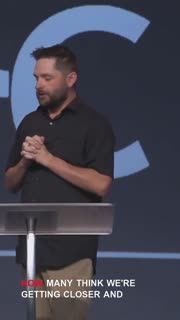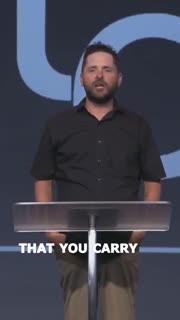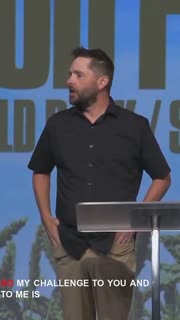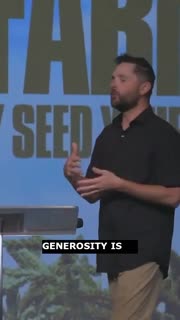Wise Stewardship: Managing Finances for God's Kingdom
Devotional
Sermon Summary
Bible Study Guide
Sermon Clips
### Quotes for Outreach
1. "I think God's cool. I think we serve an amazing God. And I love watching us continue to reach people and helping people step into the call that God's placed on their life. This is not in my message, so we'll hurry. But, you know, just because you don't work at a church doesn't mean you're not in ministry." [39:38] (22 seconds)
2. "How many think we're getting closer and closer every day to Jesus coming back? Anybody with me? Okay, then that should mean something. That should mean that this church needs to stay extremely passionate about the lost. Because we're talking about eternity, folks. You say, that's heavy. It should be heavy. It should be heavy." [40:32] (24 seconds)
3. "We don't do that by loving people, inviting people into our world, sharing our story of how God's captured our heart. Come on, somebody. And allowing the Holy Spirit to do what he's really good at, which is change us all from the inside out. Boy, I don't know why I'm on this, but this is good whether you know it or not." [42:17] (29 seconds)
4. "Let's be people that care about lost people. Don't ever let church become about you. And don't ever let church become about me. Come on, somebody. Let's always make it about the person. Who might not be connected to him yet." [43:24] (23 seconds)
5. "You show me your checkbook, I'll show you what you care about. And if you looked at mine, you would see, that I have a strong passion for golf right now. Strong. And I'm horrible. Okay, look at this verse, and I'm gonna share just one more thing on that. Look at Matthew 6, 21. For where your treasure is, there your heart will be also." [01:27:33] (36 seconds)
### Quotes for Members
1. "The reality that people could potentially, even in this room, be on their way to help. And that you and I, as believers, that have the privilege. Privilege of knowing where we're headed. We have the responsibility to help that other person that may not be have a connection with Jesus. And I believe that happens the best in God's house." [40:32] (27 seconds)
2. "Y'all believe that you carry a call, that God has commissioned you to share the good news? It's one of the biggest commands he gives us as a Christ follower. It's to get out and share the gospel. And we don't do that with picket signs, just so we're clear. We don't do that standing down on Main Street with, you know, get right or go to hell signs." [42:17] (28 seconds)
3. "So my challenge to you and to me is like, hey, let's set all of that down. Let's set all of these pre-assumptions. Let's set all of these things, let's set them down. Let's back off of that for today. And let's listen and see what God has to say about this. Is that okay? Y'all with me on that? You willing to take that journey? I hope so." [52:23] (22 seconds)
4. "You can't plant a seed of tithe and live like a fool in all the other areas and expect your finances to be healthy. Well, I tithe. Great job. But if you go to Galatians, this has been a big thing that we've been focused on. I think it may have been here as well. But Galatians 6, 7 through 9, do not be deceived. God cannot be mocked. A man reaps. It's what he sows. Even in the area of your finances." [55:52] (27 seconds)
5. "Generosity is actually anything over and above our tithe. We use the word generous like, hey, let's be generous. People have generosity. It's part of our vibe. I think one of the biggest reasons why we do that, even when we're talking about the tithe specifically, is because it cuts less. Generosity sounds better. We hear the word tithe and we, generosity's like, oh yeah, I dig generosity. But generosity actually is after." [01:22:00] (30 seconds)
Ask a question about this sermon
1. "I think God's cool. I think we serve an amazing God. And I love watching us continue to reach people and helping people step into the call that God's placed on their life. This is not in my message, so we'll hurry. But, you know, just because you don't work at a church doesn't mean you're not in ministry." [39:38] (22 seconds)
2. "How many think we're getting closer and closer every day to Jesus coming back? Anybody with me? Okay, then that should mean something. That should mean that this church needs to stay extremely passionate about the lost. Because we're talking about eternity, folks. You say, that's heavy. It should be heavy. It should be heavy." [40:32] (24 seconds)
3. "We don't do that by loving people, inviting people into our world, sharing our story of how God's captured our heart. Come on, somebody. And allowing the Holy Spirit to do what he's really good at, which is change us all from the inside out. Boy, I don't know why I'm on this, but this is good whether you know it or not." [42:17] (29 seconds)
4. "Let's be people that care about lost people. Don't ever let church become about you. And don't ever let church become about me. Come on, somebody. Let's always make it about the person. Who might not be connected to him yet." [43:24] (23 seconds)
5. "You show me your checkbook, I'll show you what you care about. And if you looked at mine, you would see, that I have a strong passion for golf right now. Strong. And I'm horrible. Okay, look at this verse, and I'm gonna share just one more thing on that. Look at Matthew 6, 21. For where your treasure is, there your heart will be also." [01:27:33] (36 seconds)
### Quotes for Members
1. "The reality that people could potentially, even in this room, be on their way to help. And that you and I, as believers, that have the privilege. Privilege of knowing where we're headed. We have the responsibility to help that other person that may not be have a connection with Jesus. And I believe that happens the best in God's house." [40:32] (27 seconds)
2. "Y'all believe that you carry a call, that God has commissioned you to share the good news? It's one of the biggest commands he gives us as a Christ follower. It's to get out and share the gospel. And we don't do that with picket signs, just so we're clear. We don't do that standing down on Main Street with, you know, get right or go to hell signs." [42:17] (28 seconds)
3. "So my challenge to you and to me is like, hey, let's set all of that down. Let's set all of these pre-assumptions. Let's set all of these things, let's set them down. Let's back off of that for today. And let's listen and see what God has to say about this. Is that okay? Y'all with me on that? You willing to take that journey? I hope so." [52:23] (22 seconds)
4. "You can't plant a seed of tithe and live like a fool in all the other areas and expect your finances to be healthy. Well, I tithe. Great job. But if you go to Galatians, this has been a big thing that we've been focused on. I think it may have been here as well. But Galatians 6, 7 through 9, do not be deceived. God cannot be mocked. A man reaps. It's what he sows. Even in the area of your finances." [55:52] (27 seconds)
5. "Generosity is actually anything over and above our tithe. We use the word generous like, hey, let's be generous. People have generosity. It's part of our vibe. I think one of the biggest reasons why we do that, even when we're talking about the tithe specifically, is because it cuts less. Generosity sounds better. We hear the word tithe and we, generosity's like, oh yeah, I dig generosity. But generosity actually is after." [01:22:00] (30 seconds)










